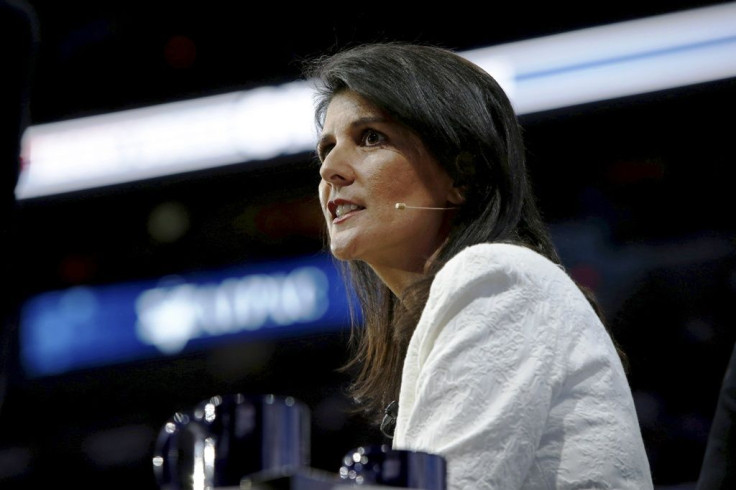US Will Not Allow Palestinian Authority Official To Hold Top UN Post, Nikki Haley Says

The Donald Trump administration will not allow Palestinian officials to take on top positions in the United Nations until the Palestinian Authority cooperates in peace talks with Israel, Nikki Haley, the U.S. envoy to the U.N., said Monday at the annual Policy Conference of the American-Israel Public Affairs Committee (AIPAC).
Last month, Washington blocked the appointment of Salam Fayyad — the Palestinian Authority's prime minister from 2007 to 2013 — to lead the U.N. political mission in Libya. At the time, Haley accused the U.N. for being “unfairly biased in favor of the Palestinian Authority to the detriment of our allies in Israel.” She also said the Trump administration was “disappointed” over U.N. Secretary-General Antonio Guterres’ move to appoint Fayyad as the next U.N. special representative to Libya.
On Monday, Haley used Fayyad’s example to state the U.S. opposition to Palestinian officials being given top posts in the U.N.
“So when they [U.N.] decided to try and put a Palestinian [Fayyad] in one of the highest positions that had ever been given at the UN, we said no, and we had him booted out. That doesn’t mean he wasn’t a nice man. That doesn’t mean he wasn’t good to America,” Haley said at AIPAC.
“What it means is until the Palestinian Authority comes to the table, until the U.N. responds the way they’re supposed to, there are no freebies for the Palestinian Authority anymore,” she added.
Moreover, Haley also said that the U.S. would not allow "Israel-bashing" at the U.N.
"And I wanted to let them to know that, look, that happened but it will never happen again. The days of Israel-bashing are over," she said.
Peace talks to settle the Israel-Palestine conflict have been hampered on several occasions. Last month, Trump said the two-state solution, which has been backed by European allies (and previously by Washington) was not the only way to resolve the conflict.
"Looking at two-state or one-state, I like the one that both parties like. I'm very happy with the one both parties like. I can live with either one," Trump said at the time.
© Copyright IBTimes 2024. All rights reserved.












